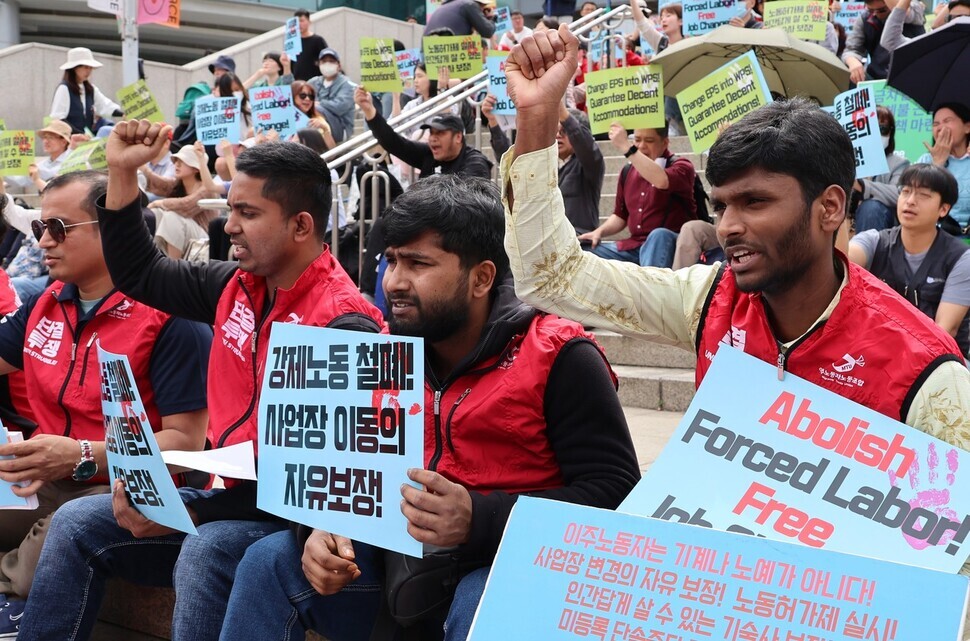hankyoreh
Links to other country sites 다른 나라 사이트 링크
Months and months of overdue wages are pushing migrant workers in Korea into debt

Mei (pseudonym), a 21-year-old from Cambodia, began working on a strawberry farm in Nonsan, South Chungcheong Province, in December 2022. Her employer started skipping payments last September. She worked 9.5-hour days, 6.5 days a week. Her monthly salary amounted to around 1.8 million won (US$1,306), as her employer regularly subtracted the cost of renovating a storage garage to build her accommodation. But she hasn’t even gotten that.
“I’ll pay you soon. Don’t worry,” her boss kept telling her. Yet she hasn’t received four months of pay. Add her severance pay, and it’s a loss of 13 million won (US$9,432). Having been forced to take out a loan of 3 million won (US$2,177) to pay for her daily expenses, Mei had no choice but to leave the farm in March.
At a public forum for migrant workers who are owed back pay hosted by the National Human Rights Commission of Korea on Monday, stories like Mei’s filled the room. Kim Hye-na, an activist who works with an advocacy group for migrant workers known as People of Earth’s Station, read the story of another victim from Cambodia, whose name was withheld.
“I finally got an official acknowledgment that I haven’t been paid my monthly wages in 20 months. But my former employer still refuses to pay, so now we’re in the middle of a civil suit. So I still haven’t been paid,” Kim read.
“Even if I win the civil case, if my former boss hides the money, I won’t get paid, and I’ll be forced to go back home. It’s happened countless times to other people. I’m worried sick.”
According to a study on overdue wages owed to migrant workers published by the national human rights watchdog, as of 2022 employers owed 122.3 billion won (US$88.7 million) in back pay to their foreign employees, an increase from 97.2 billion won (US$70.5 million) in 2018.
A survey of 379 migrant workers who are owed back pay revealed that most of them do not believe that financial troubles are the reason their employers are refusing to pay them. Among respondents, 37.6% replied that their employers are knowingly violating the law; 35.6% think they’re being mistreated simply because they’re foreign.
Experts point to the difficulties that migrant workers face in reporting employers who refuse to pay them for their labor, which differentiates their experience from that of Korean nationals. Overdue wages need to be reported by workers to be registered in the legal system, but because it’s very difficult for migrant workers to change jobs, reporting their employer poses a dilemma. If they cannot obtain official approval to change workplaces, they become undocumented aliens.
“We’ve seen cases of employers who haven’t paid their workers threatening to report migrant workers for desertion to have them deported,” said Choi Jeong-gyu, an attorney at the law firm Wongok.
“These employers also lie to their workers by saying if they don’t report the overdue payments, then they’ll help them get back into the country by recommending them as loyal employees,” Choi added.
Even if the workers report the overdue wages to the Ministry of Employment and Labor, it could take months for everything to be processed and confirmed. The designated period to settle such violations is four years and 10 months. Korean citizens can request an extension of an additional four years and 10 months if everything is not settled within the designated period. Migrant workers, however, must return to their country of origin if everything is not settled within the designated period, as they are not permitted to request an extension.
“The Labor Ministry needs to adjust regulations so that migrant workers can change places of employment if their employer refuses to pay their wages,” said Choi.
“This would enable them to earn money elsewhere while avoiding additional suffering under the abusive employer.”
By Kim Hae-jeong, staff reporter
Please direct questions or comments to [english@hani.co.kr]

Editorial・opinion
![[Editorial] Intensifying US-China rivalry means Seoul must address uncertainty with Beijing sooner than later [Editorial] Intensifying US-China rivalry means Seoul must address uncertainty with Beijing sooner than later](https://flexible.img.hani.co.kr/flexible/normal/500/300/imgdb/original/2024/0517/8117159322045222.jpg) [Editorial] Intensifying US-China rivalry means Seoul must address uncertainty with Beijing sooner than later
[Editorial] Intensifying US-China rivalry means Seoul must address uncertainty with Beijing sooner than later![[Column] When ‘fairness’ means hate and violence [Column] When ‘fairness’ means hate and violence](https://flexible.img.hani.co.kr/flexible/normal/500/300/imgdb/original/2024/0516/7417158465908824.jpg) [Column] When ‘fairness’ means hate and violence
[Column] When ‘fairness’ means hate and violence- [Editorial] Yoon must stop abusing authority to shield himself from investigation
- [Column] US troop withdrawal from Korea could be the Acheson Line all over
- [Column] How to win back readers who’ve turned to YouTube for news
- [Column] Welcome to the president’s pity party
- [Editorial] Korea must respond firmly to Japan’s attempt to usurp Line
- [Editorial] Transfers of prosecutors investigating Korea’s first lady send chilling message
- [Column] Will Seoul’s ties with Moscow really recover on their own?
- [Column] Samsung’s ‘lost decade’ and Lee Jae-yong’s mismatched chopsticks
Most viewed articles
- 1[Editorial] Transfers of prosecutors investigating Korea’s first lady send chilling message
- 2[Exclusive] Unearthed memo suggests Gwangju Uprising missing may have been cremated
- 3[Column] US troop withdrawal from Korea could be the Acheson Line all over
- 4[Editorial] Intensifying US-China rivalry means Seoul must address uncertainty with Beijing sooner t
- 5Xi, Putin ‘oppose acts of military intimidation’ against N. Korea by US in joint statement
- 6[Column] When ‘fairness’ means hate and violence
- 7‘Shot, stabbed, piled on a truck’: Mystery of missing dead at Gwangju Prison
- 8China calls US tariffs ‘madness,’ warns of full-on trade conflict
- 9Seoul government announces comprehensive measures to prevent lonely deaths
- 10Records show how America stood back and watched as Gwangju was martyred for Korean democracy